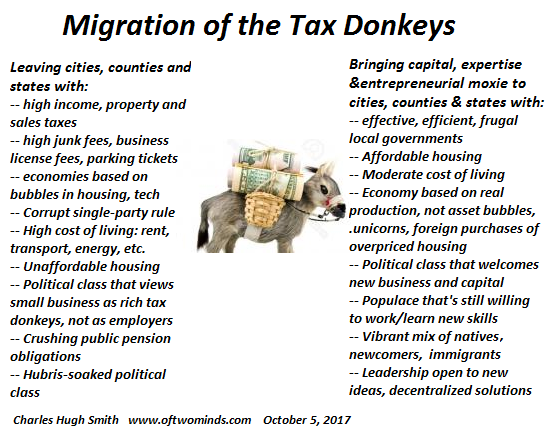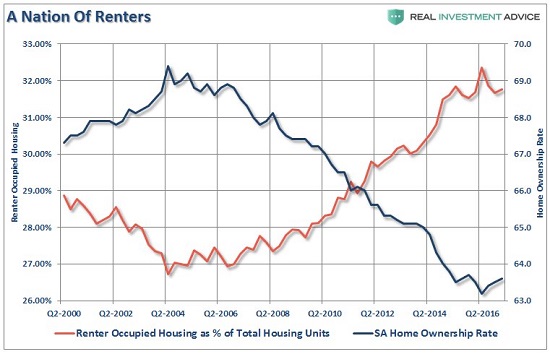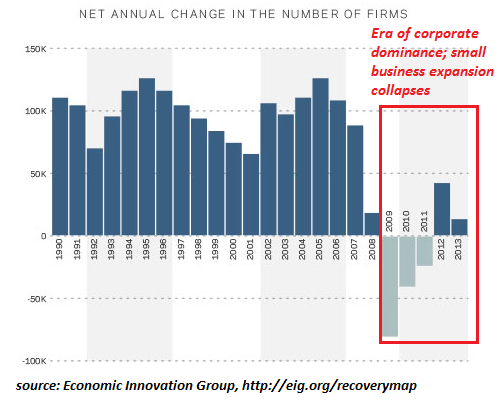Dear local leadership: here’s the formula for long-term success.
A Great Migration of the Tax Donkeys is underway, still very much under the radar of the mainstream media and conventional economists. If you are confident no such migration of those who pay the bulk of the taxes could ever occur, please consider the long-term ramifications of these two articles:
Allow me to summarize for those who aren’t too squeamish: a lot of cities and counties are going to go broke, slashing services and jacking up taxes, all to no avail. The promises made by corrupt politicos cannot possibly be kept, despite constant assurances to the contrary, and those expecting services and taxes to remain untouched will be shocked by the massive cuts in services and the equally massive tax increases that will be imposed in a misguided effort to “save” politically powerful constituencies and fiefdoms.
These dynamics will power a Great Migration of the Tax Donkeys from failing cities, counties and states to more frugal, well-managed and small business-friendly locales. I’ve sketched out the migration in this graphic: the move by those who can from incompetently managed and/or corrupt cities/counties/states to more innovative, open, frugal and better managed locales.
Unlike Communist regimes which strictly control who has permission to transfer residency, Americans are still free to move about the nation. This creates a very Darwinian competition between sclerotic, corrupt, overpriced one-party-dictatorships whose hubris-soaked political class is convinced the insane housing prices, tech unicorns, abundant services, and a high-brow culture ruled by an artsy elite are irresistible to everyone, and locales that are low-cost, responsive to their Tax Donkey class, welcoming to new small businesses, employers and talent, unbeholden to a politically-correct dictatorship and conservatively managed, i.e. not headed for insolvency.
|
Not everyone can move. Many people find it essentially impossible to move due to family roots and obligations, poverty, secure employment, kids in school, and numerous other compelling reasons.
However, some people are able to move–typically the self-employed independent types who can no longer afford (or tolerate) anti-small-business, high-tax municipalities and their smug elitist leadership that’s more into virtue-signaling than creating jobs and a small-biz conducive ecosystem. (Giving lip-service to small-biz doesn’t count.)
|
|
|
Memo to hubris-soaked politicos and elites: in case you haven’t noticed, an increasing number of the most talented and experienced workers can live anywhere they please and submit their output digitally. In other words, they don’t have to live in Brooklyn, Santa Monica or San Francisco.
This is the model for many half-farmer, half-X refugees I’ve described elsewhere: people who are moving to homesteads with the networks and skills needed to earn a part-time living in the digital economy. In a lower cost area, they only need to earn a third or even a fourth of their former income to live a much more fulfilling and rewarding life.
Not that hubris-soaked politicos and elites have noticed, but only the top few percent of households can afford to own a home in their bubble economies.Paying $4,000 a month in rent for a one-bedroom cubbyhole in San Francisco may strike the elites living in mansions as a splendid deal, but to the people who have surrendered all hope of ever owning anything of their own to call home–not so much.
|
US Renter Occupied Housing and Home Ownership Rate, Q2 2000 - 2016 |
| Though this chart is based on national data, there are many regional variations. When it takes a year just to obtain a permit to open an ice cream shop (in San Francisco), how much will the insolvent “owner” have to charge per ice cream cone to make up a year in hyper-costly rent paid for nothing but the privilege of being a scorned peon in a city ruled by privilege and protected fiefdoms? |
Annual Change in the Number of Firms, 1990 - 2013 |
Dear Rest of the Country: you have a once-in-a-generation opportunity to eat the lunch of all the overpriced, corrupt, bubble-dependent locales that are convinced they are irresistible to the cultured, creative class. Many of those folks would actually like to own some land and a house without sacrificing everything, including their health and family.
Dear local leadership: here’s the formula for long-term success: welcome talent from everywhere in the U.S. and the world; make it cheap and quick to open a business, and cheap to operate that business; make public spaces free, safe and well-maintained; insist on a transparent, responsive government obsessed with serving the public as frugally as possible; support a political class drawn from people with real-world enterprise experience, not professional politicos, lobbyists, etc., and treat incoming capital well–not just financial capital but intellectual, social and human capital. Focus on building collaboration between education and enterprise–foster apprenticeships not just in the trades but in every field of endeavor.
Provide all these things and success will follow; ignore all these in favor entrenched elites and fiefdoms and go broke as those paying the taxes decide to save their sanity, health and future by getting out while the getting’s good.
My new book is The Adventures of the Consulting Philosopher: The Disappearance of Drake. For more, please visit the book's website.
Full story here
Are you the author?
Previous post
See more for
Next post
Tags: newslettersent









































